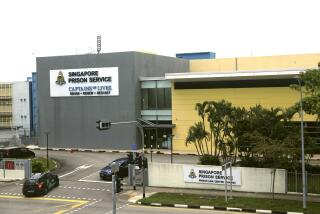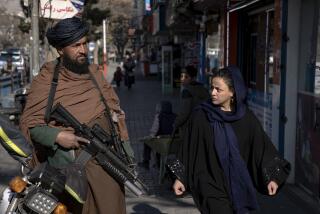Use of ‘the Cane’ Lives On : In Parts of Asia, Flogging Still Exists
- Share via
HONG KONG — There’s a room in Hong Kong’s old Lai Chi Kok prison furnished only with a padded leather bar.
More than 125 males--many still only boys--have been taken there over the last 11 years. Their hands and feet bound, stripped naked from the waist down, they were tied to the bar and then beaten with a long rattan cane.
Corporal punishment, also called caning and flogging, is still used in the British colony--and in other Asian nations once part of the British Empire.
In Singapore government officials refuse to say how many people are subjected to the punishment each year. But the number seems certain to rise with the recent passage of an immigration law allowing caning of illegal immigrants and overstayers.
In Malaysia, offenders are whipped--as well as given prison terms--for even minor drug offenses. Caning is also practiced in Brunei.
Officials in Hong Kong say privately that the punishment, decried by human rights groups as brutal and ineffective, is probably a legacy of British rule, of Britain’s strict public school system.
Caning as a disciplinary measure for recalcitrant pupils was banned only a few years ago in British public schools. It is still used in Hong Kong.
In Asia, judicial corporal punishment is only practiced in countries once ruled by the British.
Pakistan Prime Minister Benazir Bhutto put an end to the widespread practice in her country after she became the first woman leader of a Muslim nation last December. Experts said up to 200 people a day were flogged during the military rule of Gen. Mohammad Zia ul-Haq.
The highest number of floggings in Hong Kong took place in the early 1980s, when as many as 21 men were whipped in one year. The figure dropped to one in 1987.
So, when eight men were whipped last year, human rights groups became concerned that the practice was on the rise.
In a report on the colony last November, the U.N. Human Rights Committee called on the British government to use its power to outlaw flogging in the territory.
One teen-age boy has been flogged so far this year.
Magistrates in the British colony can order “the cane” for males for crimes ranging from rape and robbery to drugs and weapons possession, either in addition to or in lieu of a prison sentence.
For one crime--possession of an offensive weapon in a public place--flogging is the only alternative to a mandatory six-month jail sentence.
“Magistrates loathe to send young boys to prison,” said a government lawyer who asked not to be identified. “They hate caning too. But their hands are tied.”
The government is presently reviewing the Corporal Punishment Ordinance, which has been on the statute books in various forms since 1903. It has been reviewed several times before, however, with no change to the law.
Government officials say many of the colony’s magistrates and prison officials hate the practice, described by one as a “brutalizing act.” They admit that it does not seem to rehabilitate criminals.
“But it is an effective deterrent in terms of public perception,” said Jonathan McKinley of the Security Branch, which oversees government legal policy.
“Many people believe a good whack can be an effective deterrent,” he said.
In Singapore, criminals can be caned for a wide range of offenses, including attempted murder, rape, robbery, housebreaking and rioting.
In Hong Kong, the number of strokes is limited to 18 for adults and six for children under 14 years of age.
Pang Sung Yuen, a superintendent of the correctional services department, said a medical officer is present at every flogging, carried out by specially assigned prison officers.
More to Read
Sign up for Essential California
The most important California stories and recommendations in your inbox every morning.
You may occasionally receive promotional content from the Los Angeles Times.










